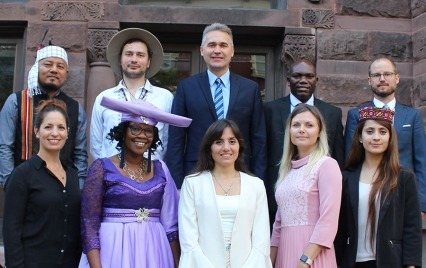The 2019–2020 NIDA Hubert H. Humphrey Fellows gathered virtually on June 7, 2020, to celebrate the formal end of their fellowship years. About half of the fellows had returned home, and all completed the year virtually as COVID-19 pandemic restrictions took effect throughout the world. J. Randy Koch, Ph.D., coordinator of the Virginia Commonwealth University (VCU) Humphrey Fellowship Program, convened the Zoom celebration and congratulated the fellows for demonstrating real leadership as they faced the challenges of their interrupted year. Mr. Anthony Koliha, director of the Office of Global Affairs Educational Programs at the U.S. Department of State, thanked the fellows and noted that the United States had benefitted from their expertise. Ms. Meaghan Dolan, program manager at the State Department contractor, Institute of International Education, reminded the fellows that the personal and professional challenges of their year have become accomplishments that enhance their unique expertise and experiences at VCU, professional affiliations, and activities in Richmond. Robert J. Balster, Ph.D., associate coordinator of the VCU Humphrey Fellowship Program, praised the fellows’ flexibility and creativity in dealing with the adversity caused by the pandemic. NIDA International Program Director Steve Gust, Ph.D., told the fellows that NIDA and its partners view every Humphrey Fellow as an ambassador for science and part of an international network of drug abuse researchers, policymakers, and treatment providers devoted to evidence-based, public health approaches to preventing and treating substance use and abuse. He noted that after this challenging year, the 2019–2020 fellows were well prepared to join the regional and international experts addressing the emergent issue of adverse effects for people who use drugs. Research indicates that stress and anxiety related to COVID-19 may contribute to increased drug use as well as respiratory complications for people who use cannabis, methamphetamines, nicotine, or opioids.
The keynote speaker was Virginia State Senator Ghazala Hashmi, Ph.D., who previously directed the Center for Excellence in Teaching and Learning at Reynolds Community College. In that role, she was the liaison between Reynolds and the VCU Humphrey Fellows. Noting the COVID-19 pandemic and the global demonstrations for racial and economic equality, Dr. Hashmi congratulated the fellows for having chosen “an incredible and transformative year” in which to chart new pathways. Quoting a former Humphrey Fellow who told her the fellowship year had “changed the way my mind works,” Dr. Hashmi encouraged the fellows to use the leadership, commitment, and collective action that they employed during their fellowship year to think and act in new ways. She discussed recent research in neuroplasticity, which has demonstrated that adult brains can be reshaped and individuals can alter the ways in which they interact with and perceive the world by participating in transformative experiences like the Humphrey Fellowship or by making conscious, deliberate steps to create a new mindset by acknowledging and accepting new values. She suggested that these scientific findings could be applied to societies as well as individuals, driving efforts to reshape governmental, social, and economic structures so that they work for human society. Dr. Hashmi compared the fellowship experience to the literature theory of the hero’s journey, with the fellows going back to their communities transformed in some way after having made an extraordinary journey, met incredible mentors, survived personal challenges, and found their own rewards. She urged the fellows to think very consciously about what they are bringing home, how they will share with their communities, what leadership positions they will take, and how they are going to impact the world.
The 2019–2020 Humphrey Fellows each spoke, thanking the program sponsors and administrators, their faculty advisors, their host families, the James River Hikers, and their classmates. Each fellow cited an accomplishment:
- Eugeniu Cotelea, M.D. (Republic of Moldova), and Marcella Katjijova (Namibia) completed International Society of Substance Use Professionals courses to become International Certified Addiction Professionals.
- Leticia Keuroglian (Uruguay) spent her professional affiliation in epidemiology with James Anthony, Ph.D., Michigan State University.
- Kristina Köhler, M.P.H. (Estonia), was accepted into a doctoral program at VCU.
- Adam Kurilla, M.S. (Slovakia), submitted two manuscripts for publication.
- Oleg Lukyanovych, M.D. (Ukraine), assisted with planning the COVID-19 response in the city of Richmond and Henrico County.
- Venant Mligo (Tanzania) received funding to start a nongovernmental organization.
- Lalchhanhima Ralte, M.B.B.S. (India), learned about motivational interviewing and spent his professional affiliation with David Metzger, Ph.D., University of Pennsylvania.
- Heftziba Golan Rand (Israel) learned new approaches to treatment issues for victims and perpetrators of child abuse.
- Sumaira, M.A. (Pakistan), used a review of the Pakistan anti-narcotics policy to design a social research study and training approach.
